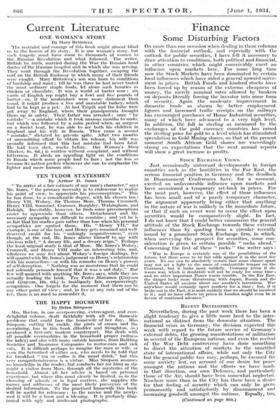Current Literature
ONE WOMAN'S STORY
By Mary Britnieva
The restraint and courage of this book might almost blind us to the horror of its story. It is one woman's story, but such tragedy must have come to thousands of women in the Russian Revolution and what followed. The writer, British by birth, married during the War the Russian head doctor of the Russian hospital unit in which she was serving. They went through the Revolution together, escaping the raid on the British Embassy in which many of their friends were caught. Mary Britnieva's son was born to conditions of hardship and want ; till he was three he had never tasted the most ordinary staple foods, let alone such luxuries as chicken or chocolate. It was a world of barter now : six yards of English rep might buy a fowl and five pounds of butter—or, if the meshetchnik were more dishonest than usual, it might produce a live and uneatable turkey, which had to be kept as a pet. At last Tsapik and the baby were got away to England, where their grandparents brought them up in safety. Their father was arrested : one " by mistake "—a mistake which it took anxious months to undo, but which was followed by a ealm period when, as surgeon on a Soviet boat, he was able to see both his children in England and his wife in Russia. Then came a second " mistake," dictated by private spite. After two months of unremitting effort to obtain his release, his wife . was casually informed that this last mistake had been fatal. He had been shot, weeks before. One Woman's Story (Barker, 8s. 6d.) is written without complaint, and without bitterness. It sheds an appalling light on the conditions in Russia which some people had to face : not the less so because its author prefers whenever she can to emphasize the lighter and more human side.




































 Previous page
Previous page